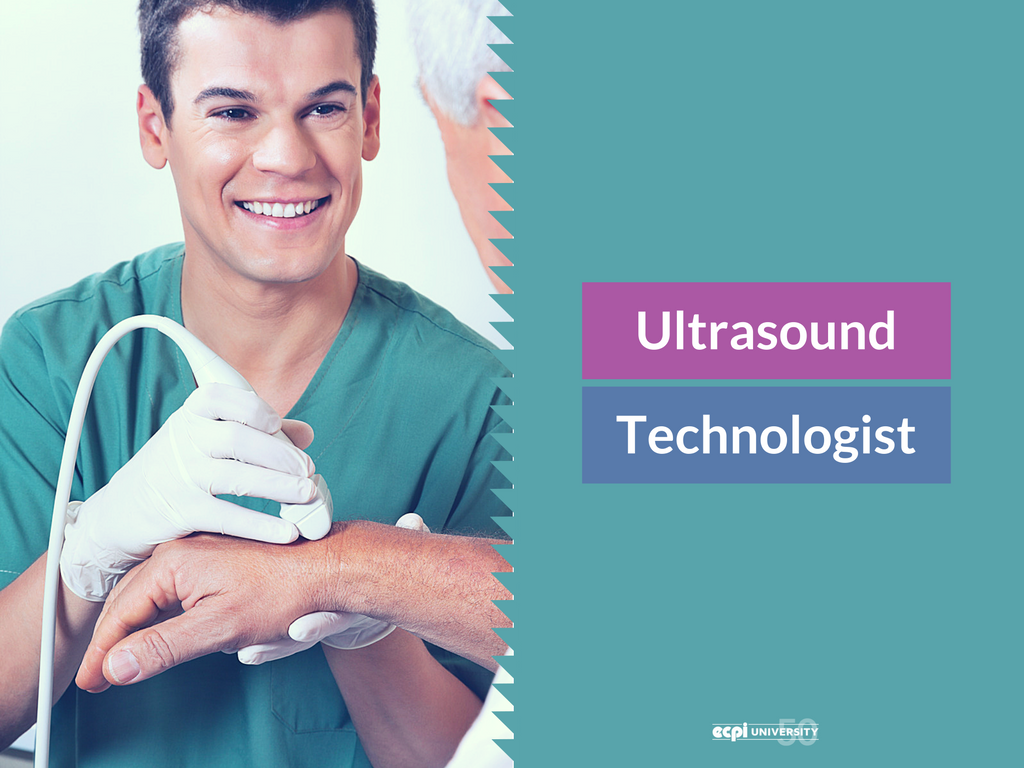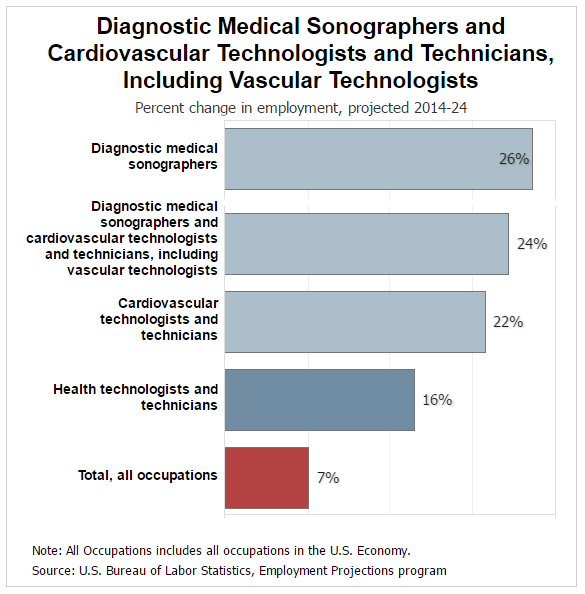How do you Become an Ultrasound Technologist?
Diagnostic medical sonography is a rewarding and exciting career option. Ultrasound technology is dynamic, evolving, but adheres to strict industry standards. This field plays a key role in the medical profession.
According to the Bureau of Labor Statistics, employment opportunities for ultrasound technicians is expected to increase by up to 26% by 2024. This could mean lucrative options for graduates. Medical facilities are increasingly adopting ultrasound technology and phasing out costly, invasive procedures. Ultrasound is also a safer option; it can be used on the elderly, children, and pregnant people.
Duties of an Ultrasound Technologist
Ultrasound technicians handle a variety of tasks as part of their daily functions. Typically, they perform the following roles:
- Select and prepare diagnostic imaging equipment
- Prepare patients for procedures
- Gather and file ultrasound records
- Conduct relevant tests using imaging equipment
- Review test results to ensure image quality and identify vital diagnostic information
- Submit summary of diagnostic information to physicians
Hospitals employ the bulk of technicians while physicians' offices and outpatient diagnostic clinics take up the rest. Some of the work is carried out in low light environments. Although the majority of work is scheduled for normal working hours, ultrasound technologists may also operate during off-the-clock hours, holidays, or weekends. This is usually necessitated by emergency situations.
Career Track Options for Ultrasound Technologists
As an ultrasound technologist, you can take advantage of a variety of possible career tracks. From diagnostic medical sonography to educator roles, the field provides much-needed flexibility. It is possible to advance your career by assuming administrative, supervisory, or managerial roles.
Positions like the director of ultrasound department or lead sonographer typically require professional experience of three or more years. Certification also helps open more doors in this ever-expanding field. Many technicians find employment at companies that manufacture medical diagnostic equipment. You can work as a sales representative, consultant, or technical adviser. The area of ultrasound research provides additional career options.
Diagnostic medical sonography is a popular career option for qualified technicians. Many graduates focus on clinical and ultrasound work before advancing to other roles. Some assume departmental leadership positions, which involve various administrative duties while still carrying out clinical work. Acquiring additional qualifications or certifications enhances prospects when aiming for full managerial roles.
Becoming a sonography educator is another viable career path. In this role, you work in clinical hospital settings or educational institutions. Educator positions allow you to share your experience and knowledge with students. It is a highly fulfilling and rewarding role that has plenty of benefits, both physical and emotional. A bachelor’s, master’s, or doctoral degree is needed to qualify for educator roles.
Ultrasound Technology: A Career with Room for you to Grow
Advancing your career by embarking on research sonography is a practical way to boost income. The majority of ultrasound technologists become eligible for the position after seven or more years of professional experience. The role entails designing and conducting research studies in the area of medical sonography. Work in this field further strengthens your career prospects. It makes it easy to gain much-needed recognition as a distinguished professional in the industry.
Ultrasound application specialist jobs allow you to handle supporting roles in private or public organizations. You may be tasked to oversee after-sales installations, support sales agents or demonstrate ultrasound equipment to customers or prospects. You may attend conferences or trade shows as a company representative.
Qualifications in ultrasound sonography also enable you to explore entrepreneurial options. Self-employed technicians perform wide-ranging duties on contract or work as independent sales representatives. Embarking on this route demands strong self-discipline, confidence, motivation, and exceptional organizational skills.
Training and certification in Ultrasound Technology
To become an ultrasound technologist, you are required to complete accredited training in medical sonography. Duration of training programs depends on which level of education you want to achieve and whether you choose to go to a traditional school or learn in an accelerated format. Coursework typically covers ultrasound imaging, physiology, ethics, anatomy, protocols, and physics.
The majority of employers also require certification. The credentials provide a measure of your competency and technical knowledge. Prerequisites for taking a certification exam include earning an accredited qualification or having clinical experience. The certification options typically consist of core and specialty areas like principles and instrumentation in addition to obstetrics, abdomen, gynecology, and more.
The ECPI University offers an Associate of Applied Science in Diagnostic Medical Sonography program. In an accelerated format, you could earn your degree in as little as 15 months. Contact an admissions counselor today to see if ECPI University would be a good fit for you.
It could be the Best Decision You Ever Make!
DISCLAIMER – ECPI University makes no claim, warranty, or guarantee as to actual employability or earning potential to current, past or future students or graduates of any educational program we offer. The ECPI University website is published for informational purposes only. Every effort is made to ensure the accuracy of information contained on the ECPI.edu domain; however, no warranty of accuracy is made. No contractual rights, either expressed or implied, are created by its content.
Gainful Employment Information – Sonography - Associates
For more information about ECPI University or any of our programs click here: http://www.ecpi.edu/ or http://ow.ly/Ca1ya.





